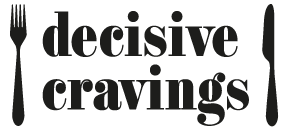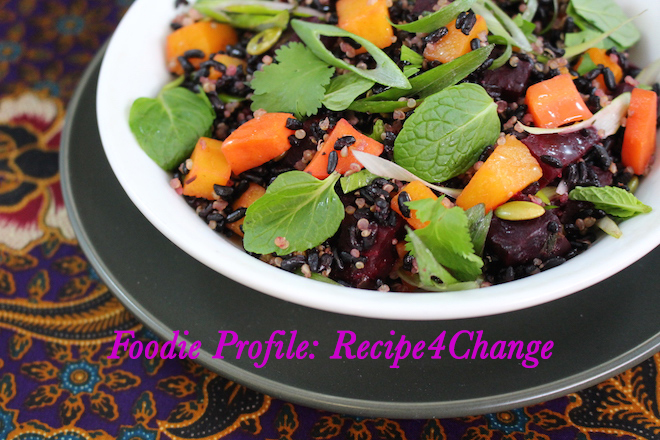Foodie Profile: Recipe4Change
by Decisive CravingsFoodie Profile: Recipe4Change
Our chat with Christine Smith of Recipe4Change – an award-winning ethical enterprise made of food professionals who use food to change the lives of everyday Australians and help them overcome barriers to a better life.
1. Christine, could you tell us a bit about how Recipe4Change started and about the work you do?
People and food have always been my passions. After many years working for three job service providers, I was frustrated with the way job seekers were not really assisted with the restrictive contracts so I put together a one page flyer and in 2011 approached a previous employer and they agreed that I could run work experience programs. My idea was to use my extensive cooking skills (started when I was 9) and understanding of job seekers feeling the system let them down and set up in a kitchen and start a small veggie patch. After a few months I employed a like minded chef, enlisted the assistance of Bunnings Scoresby and partnered with SecondBite and from there our services grew. We have run life skills programs for young adults with intellectual disabilities whose parents were committed to their future independence. Today in addition to still working with the long term unemployed we now provide fresh food supplies to seven local primary schools for students who attend with no breakfast or lunch, packaged meals for student families who are experiencing tough times. Every Thursday we open the doors for a community lunch cooking our meals from scratch and utilising perfectly good surplus produce destined for landfill. Our primary schools cooking program initiative, Food4Kids was a big success but not sustainable as schools couldn’t afford to pay and I couldn’t find funding. Teaching young students to cook from scratch using basic equipment and replicating the recipes at home was immensely rewarding.
2. Your efforts have already resulted in some pretty incredible changes in people’s lives, could you tell us about this?
There are many stories from over the last six/seven years but a few come to mind. It’s not always about food it is more about treating people like human beings and supporting them in a meaningful way that helps them regain independence and self respect. Give them a hand up not continual handouts that keep them in poverty.
1. Colin, a male in his late twenties had experienced unemployment and under employment for over ten years when he was referred to me. Whilst he wasn’t interested in kitchen work as he wanted an IT helpdesk role he proved to be a fabulous kitchen hand with a wicked sense of humour. I mentored him with one-on-one on interview skills and after six months he obtained the exact role he wanted and now owns his own house. He still calls in from time to time even after three years.
2. There was a primary school student 6 years old who for many months went to school without having eaten dinner, breakfast & nothing in his lunch box. Every day after school he went home and would light candles for his little brothers as Mum & Dad were drug addicts and passed out. There was no electricity to see or cook food. Eventually all three kids went to live with their grandma and we assisted with food so she could keep them together. On a pension she was struggling. If we didn’t do our little bit those three children could have ended up in separate foster homes anywhere in Victoria.
3. Andrew was a drinker and heavy smoker and hadn’t worked for years when he was referred to me. In a short time he proved to be team leader material for our cleaning team. Some days he really struggled to come in as he would binge drink at night. He was the carer for both of his ageing and sick parents. Trying to find an employer who would just give him a go proved to be impossible. Over the period of eighteen months both his parents died suddenly and his sister suffered a massive stroke whilst out shopping and Andrew had to make the difficult decision to turn off her life support. During the three years that Andrew attended he said without my support he would have ended up in the gutter or worse. I gave him a reason to get out of bed and knew I relied on him but most of all I cared and treated him with respect being firm and ensuring he eat when he was on site. Over time Andrew started to cook some of his Mum’s recipes and brought them in to share. Though I rarely give job seekers my personal number I did to Andrew and took many phone calls in the evenings when he was struggling to cope with life. Today Andrew is sober and not smoking and moved close to his daughter. Though still not working he is healthier and has quality of life and is not ashamed of himself.
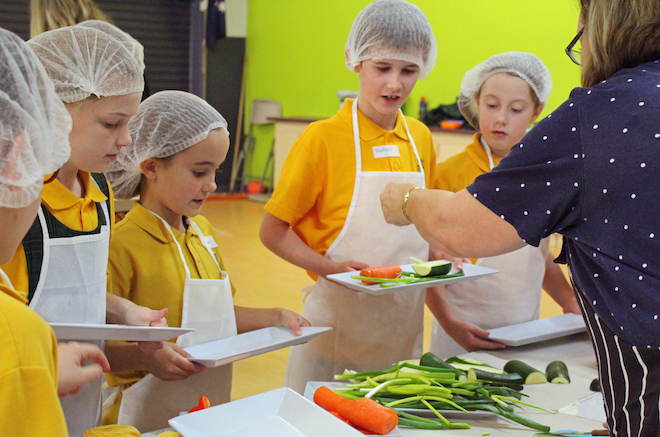 Recipe4Change’s primary school cooking class
Recipe4Change’s primary school cooking class
3. The statistics on homelessness in Australia and people, particularly children, going without food are quite staggering. Could you share some of those statistics and explain the causes, and some tips on what we can all do to help?
– Currently there are approximately 105,000 homeless
– 2.2 million Australians live in poverty
– 10.9% of children live in poverty
– 1 in 4 pensioners live in or are close to poverty
– Up to 1 in 3 kids go to school hungry and with little in their lunch boxes
– 51% of pensioners don’t eat enough fruit and 66% don’t eat enough vegetables
– Aside from supermarkets it is almost impossible to buy fresh fruit and vegetables. Our last research paper in 2016 results showed there were only 6 green grocers in the Knox council area, now five with the closure of Stud Park Fruit and Vegetables
– The causes are many and diverse. Mental health and poor physical health are leading factors in the continuation of homelessness and poverty.
– Domestic violence, death of one parent and loss of sustainable employment are major factors. Yes drugs, alcohol and gambling also figure but I don’t believe to the degree that the general public believes. There are so many stories of the families I assist and only two are the result of drugs or alcohol. I am sure I too do not know all the details and I don’t need to. I just need to know someone is hungry and needs wholesome food.
How to help is a difficult question. Homelessness and poverty are worldwide issues and are not being addressed by governments. Here and in the UK there are a couple of charities that “own homelessness” or have cornered the market in food poverty. It is big business to a few where little of the money is actually used for which it is meant. With food poverty charities stand tall handing out poor quality highly processed food laden with salt and sugar. Poor people don’t deserve poor food.
Small businesses like Recipe4Change and CanCookUK strive to provide wholesome food/meals but don’t get a look in with government funding. We are small voices with no clout. Personally I would love to be able to engage with the UN Sustainability Goals Fund (UNSD) and Corporate Australia to really make a difference. At the end of the day all I provide is a bandaid which does not make me smile and the main reason I have previously not spoken out about the services I provide.
4. On Wednesdays you run a free marketplace so that people have access to pantry staples, and fresh produce. Who are the staples and produce provided by and who are your greatest supporters in terms of donating food and ingredients?
Our fresh produce comes from local supermarkets via SecondBite. A small local bakery provides fresh bread on Thursdays. Many local families drop off pantry items anonymously when they know I have left. We regularly receive excess fruit, veg and herbs from visitor’s gardens which they either donate or swap for meals or other produce. We need to buy many items for our kitchen and we are lucky that many local traders give discounts.
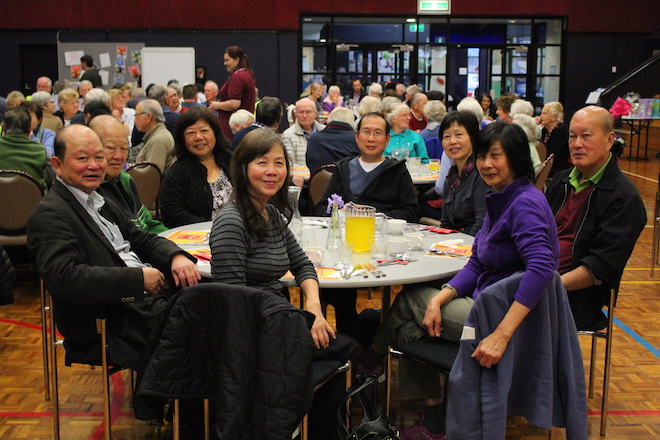 A Recipe4Change Community lunch
A Recipe4Change Community lunch
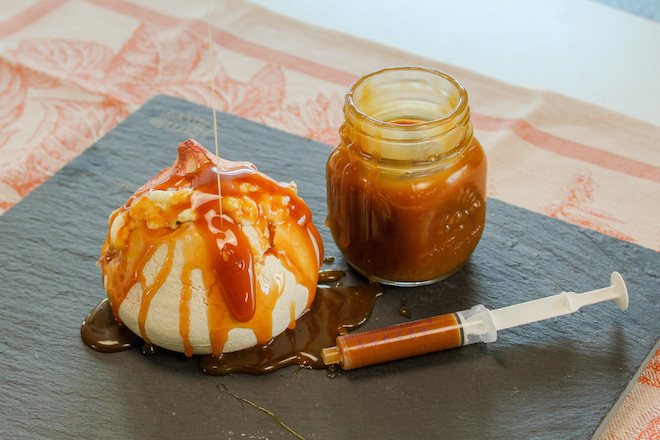 Dessert development – meringue with salted caramel sauce
Dessert development – meringue with salted caramel sauce
5. You provide a free lunch 48 weeks of the year. Could you tell us about the lunches, why you started them, where they’re held and who can come along?
I originally started the lunches to share the food my trainees were making. I started a Facebook page to let the locals know and slowly our numbers grew. People who came to lunch gave a gold coin donation which assisted with pantry costs. My landlord at the time decided my presence wasn’t necessary and my services not needed in Rowville citing the cost of houses demonstrated that people were well off. The opposite was actually true. With houses now over $700k and rentals over $450 per week there is a lot of rental and mortgage stress.
My local councillor assisted with a temporary move until Knox council renovated our current premises. When we moved I started to educate our lunchers to think about where food comes from and the amount of time, energy and money it costs to put a plate of food on the table and donations doubled. Those who are doing it tough pay according to their means, we do not monitor who does and who doesn’t pay or how much.
6. What are the highs and lows of running an ethical enterprise?
The lows are numerous which I will get out of the way first. Getting people to understand that running an ethical enterprise is not about giving back because it feels good once a year – it is a way of life. Congruency is paramount (not saying I am perfect, far from it) but perception is everything so publicly it is important to be seen to be consistent in the message given.
In general the small business owners I know don’t value people over profit. They don’t think deeper, they don’t want to. I have found it a constant struggle to find like minded people which has resulted in my working more in the business than on it. I have been let down by several businesses that said they loved what I do but in the end don’t actually do what they say they would. It is energy sapping.
The highs are what keep me getting out of bed every day. It’s the smiles on people’s faces when they realise you care. It’s the hugs from the oldies who are lonely with no family. It’s knowing I am making a difference to people’s lives by doing things right. No judgment just taking people at face value and not making life more difficult for them. Knowing I have substantially improved lives. The trust in my relationships has cultivated respect from those that have taken the time to understand what I am striving for and made comment about the consistency of my decisions, values and quality of the work I do.
 In the Recipe4Change kitchen prepping
In the Recipe4Change kitchen prepping
7. Do you have tips or resources for people wanting to start an ethical business?
Be very clear on your purpose. Think about who potential stakeholders/strategic partners might be at the very beginning when putting together business and marketing plans. When choosing stakeholders or strategic partners look beyond values. Dig deep to ensure their purpose aligns with your own both at company level and the individuals you will work with. Employ paid staff or volunteers who share not only your vision but also purpose.
8. Is there a recipe from the Recipe4Change kitchen that you could share with our readers?
Melbourne is famous for its lemon tarts so our recipe for lemon butter is fast to make and perfect every time.
Ingredients:
200ml lemon juice
2 tbls of lemon zest
185g sugar
3 eggs
125g unsalted butter
Prep time: 10 minutes Cooking time: 3 minutes
Place butter in a microwave safe jug and microwave on high for 45 seconds
In a microwave safe bowl place eggs & sugar and whisk until combined
Add melted butter and stir till combined
Place jug in microwave for 60 seconds, take out and stir
Repeat this process for two more times
Your lemon curd is ready when you can see whisk marks on the surface
In kindness to your waistline put it in jars & store in the fridge or a for a decadent dessert use it in a sweet pastry case
Like ice cream? It’s so yum over creamy vanilla ice cream while it is still warm.
Warning: People have been known to take a spoon to a jar.
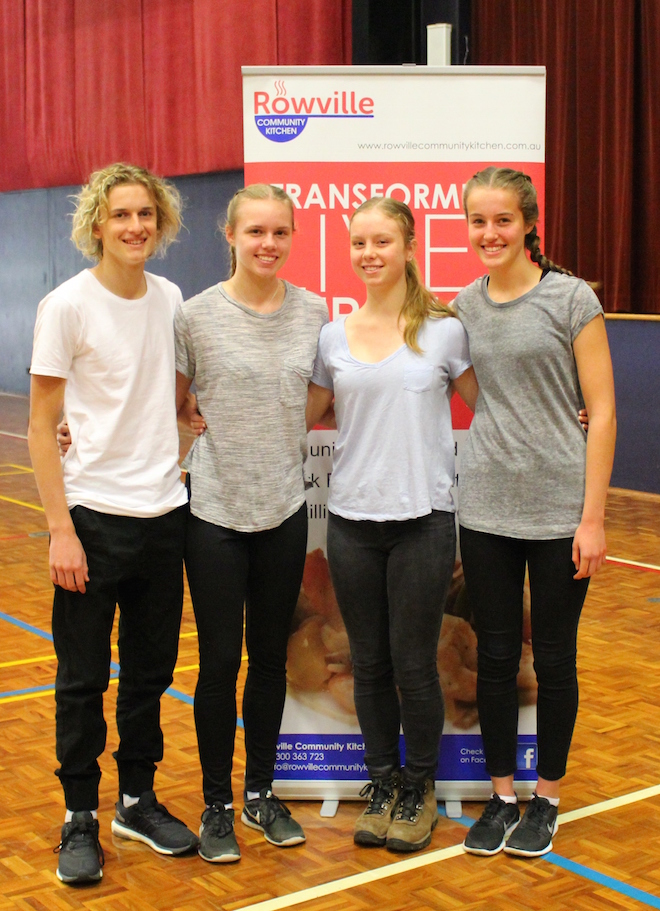 Recipe4Change volunteers from Caulfield Grammar
Recipe4Change volunteers from Caulfield Grammar
9. What do your volunteers do, and how can people interested in volunteering with Recipe4Change get involved?
I have volunteers in the kitchen, serving lunch and doing book work. There is always something to do. We are desperate for help with fundraising or grant writing or who has in-depth knowledge to streamline our social media. To volunteer they can call me on 1300 363 723 or email: info@rowvillecommunitykitchen.com.au
10. What is next for Recipe4Change?
I am currently negotiating with an Registered Training Organisation (RTO) and the Apprenticeship Centre to work with year 10 & 11 high schools students with intellectual and learning disabilities. The proposal is to provide traineeships for twelve months whereby they are paid for some hours and attain a qualification in food production which will give credit towards year twelve.
Schools are slow to respond and not providing the information to parents in a timely fashion so numbers might not make the program financially viable.
Well under way in development is my program for women to find their true purpose in life through four hour workshops, two day retreats and eventually a six day retreat in Italy. My program is based in the kitchen, effectively doing what I have been doing for the last six years but with women who essentially have to believe there is more to life than what they are currently doing, and has greater meaning that will make the world a better place. I will use the UNSD Goals as examples to guide them. There will also be ongoing mentoring to ensure dreams and goals are actioned. The aim is that my workshops, etc will fund our current operations.
(All images by Lotti Kershaw of Clearcut Media)
Website: http://rowvillecommunitykitchen.com.au/
Facebook: Rowville Community Kitchen
Instagram: @rowvillecommunitykitchen
Twitter: @RowvilleCK
